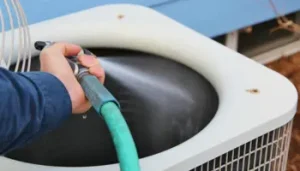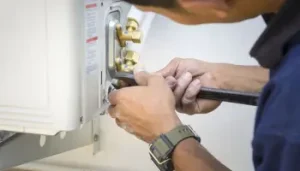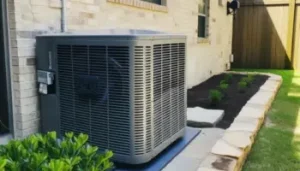Indoor air quality (IAQ) plays a crucial role in maintaining a healthy and comfortable home environment. Poor air quality can lead to various health issues, including allergies, respiratory problems, and even chronic diseases. Understanding common household pollutants and implementing practical solutions to improve air quality can significantly enhance your living conditions. This guide explores the importance of indoor air quality, identifies common pollutants, and offers effective strategies to combat them using HVAC system enhancements and regular maintenance.
The Importance of Indoor Air Quality
Indoor air quality is essential for several reasons:
- Health and Well-being
- Poor air quality can exacerbate allergies, asthma, and other respiratory conditions. Long-term exposure to pollutants can lead to serious health problems, including heart disease and lung cancer.
- Comfort
- Clean air contributes to overall comfort in your home. Unpleasant odors, excessive dust, and high humidity levels can make living spaces uncomfortable.
- Energy Efficiency
- A well-maintained HVAC system that promotes good air quality operates more efficiently, reducing energy consumption and lowering utility bills.
- Preservation of Home Interiors
- Pollutants like dust, mold, and pet dander can accumulate on surfaces and in HVAC systems, leading to increased wear and tear on your home and its furnishings.
Common Household Pollutants
Identifying and understanding common indoor pollutants is the first step towards improving air quality.
- Dust and Dust Mites
- Dust is a mixture of tiny particles, including dead skin cells, fabric fibers, and dirt. Dust mites, which feed on these particles, can trigger allergies and asthma.
- Pet Dander
- Pet dander consists of tiny, even microscopic, flecks of skin shed by cats, dogs, rodents, birds, and other animals with fur or feathers. These particles can cause allergic reactions and respiratory issues.
- Mold and Mildew
- Mold and mildew thrive in damp environments and can release spores into the air, leading to respiratory problems and allergic reactions.
- Volatile Organic Compounds (VOCs)
- VOCs are emitted as gases from certain solids or liquids, including paints, cleaning supplies, and building materials. Long-term exposure to VOCs can have serious health effects.
- Pollen
- Pollen can enter homes through open windows and doors, causing seasonal allergies and respiratory issues.
- Tobacco Smoke
- Secondhand smoke contains harmful chemicals that can cause respiratory problems, heart disease, and cancer.
- Carbon Monoxide (CO)
- Carbon monoxide is a colorless, odorless gas produced by burning fossil fuels. High levels of CO can be deadly.
- Radon
- Radon is a naturally occurring radioactive gas that can enter homes through cracks in the foundation. Long-term exposure to radon increases the risk of lung cancer.
Practical Solutions for Improving Indoor Air Quality
Improving indoor air quality involves a combination of reducing pollutants at their source and enhancing your HVAC system to filter and circulate clean air effectively.
1. Regular HVAC Maintenance
Regular maintenance of your HVAC system is crucial for maintaining good air quality.
- Change Air Filters: Replace HVAC filters every 1-3 months to ensure efficient air flow and filtration.
- Clean Ductwork: Have your air ducts professionally cleaned to remove accumulated dust and debris.
- Inspect and Clean Coils: Ensure that the evaporator and condenser coils are clean to improve system efficiency and air quality.
- Check for Leaks: Inspect ducts for leaks and seal any gaps to prevent contaminants from entering the system.
2. Use High-Quality Air Filters
Upgrade to high-efficiency particulate air (HEPA) filters, which can capture up to 99.97% of airborne particles, including dust, pollen, and pet dander.
3. Control Humidity Levels
Maintain indoor humidity levels between 30% and 50% to prevent mold growth and reduce dust mites.
- Use Dehumidifiers: In humid climates, dehumidifiers can help maintain optimal humidity levels.
- Fix Leaks: Repair any leaks in your home to prevent moisture buildup and mold growth.
4. Improve Ventilation
Proper ventilation helps dilute indoor pollutants and bring in fresh air.
- Use Exhaust Fans: Install exhaust fans in kitchens and bathrooms to remove moisture and pollutants.
- Open Windows: When weather permits, open windows to allow fresh air to circulate.
- Use Mechanical Ventilation: Consider installing an energy recovery ventilator (ERV) or heat recovery ventilator (HRV) to improve air exchange without losing energy efficiency.
5. Reduce VOCs
Minimize the use of products that emit VOCs.
- Choose Low-VOC Products: Opt for low-VOC paints, varnishes, and cleaning supplies.
- Store Chemicals Properly: Keep chemicals in tightly sealed containers and store them outside of living areas.
6. Monitor and Mitigate Radon
Test your home for radon levels and install a radon mitigation system if necessary to reduce exposure.
7. Use Air Purifiers
Air purifiers with HEPA filters can help remove pollutants from the air in specific rooms, especially if you have allergies or respiratory issues.
8. Keep Your Home Clean
Regular cleaning reduces the buildup of dust, pet dander, and other pollutants.
- Vacuum Regularly: Use a vacuum with a HEPA filter to capture small particles.
- Dust with Damp Cloths: Avoid dry dusting, which can spread particles into the air.
- Wash Bedding and Curtains: Clean these items frequently to reduce dust mites and allergens.
Conclusion
Maintaining good indoor air quality is essential for your health, comfort, and the efficiency of your HVAC system. By identifying common pollutants and implementing practical solutions, you can significantly improve the air quality in your home. Regular HVAC maintenance, using high-quality air filters, controlling humidity, and improving ventilation are key steps in ensuring a clean and healthy living environment.For professional HVAC maintenance and air quality solutions, trust Diamond Heating and Cooling. Our experienced technicians are dedicated to helping you create a comfortable and healthy home. Contact us today to schedule an appointment and breathe easier knowing your air quality is in expert hands.



